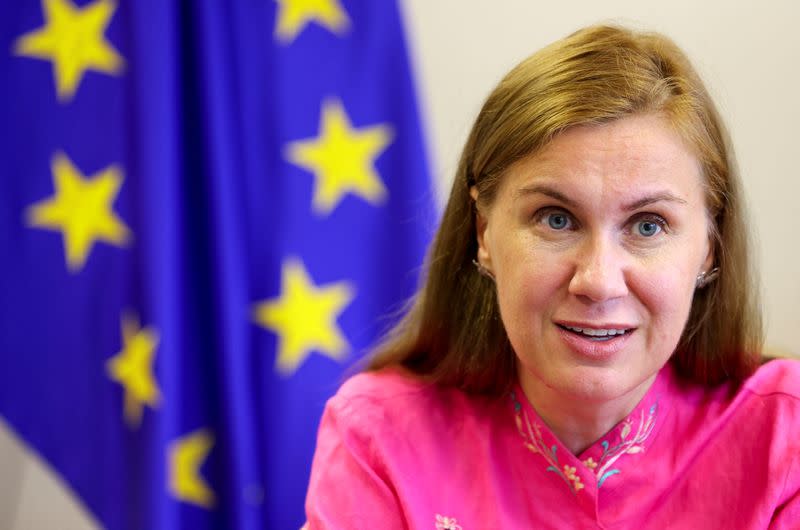EU hopes energy funds can unlock deal on Russian oil sanctions
By Kate Abnett
BRUSSELS (Reuters) - A European Union proposal last week to support oil infrastructure in states heavily dependent on Russian crude should provide a chance for countries to agree sanctions on Russian oil, the EU's energy policy chief said on Monday.
The EU executive European Commission this month proposed new sanctions, including an embargo on Russian oil, but Hungary's opposition has so far thwarted the unanimous approval from all 27 member countries needed to pass them.
In a package of proposals unveiled last week for how the EU could quit Russian fossil fuels by 2027, Brussels offered up to 2 billion euros ($2.1 billion) in support for oil infrastructure to help land-locked countries - Hungary, the Czech Republic and Slovakia - pivot to non-Russian supplies.
"The Commission really showed extreme flexibility to even allow fossil fuel investments," EU energy commissioner Kadri Simson told Reuters in an interview, pointing to an EU agreement from December to stop funding fossil fuel cross-border infrastructure to support climate goals.
"This flexibility was necessary to provide landlocked countries a chance to agree these sanctions," she said.
Hungary, which is heavily dependent on Russian oil, has said it would need about 750 million euros in short-term investments to withstand an embargo.
"We are really trying to secure that none of our member states will face security of supply issues. And this was also the reason why we added in our RePowerEU plan the list of necessary pipeline projects that will offer landlocked countries alternatives," Simson said, referring to the EU's proposals to wean itself off Russian fuels.
Simson said Commission President Ursula von der Leyen had, during a visit to Budapest this month, outlined how the EU can support upgrades of Hungarian refineries now designed to receive Russian Urals crude, and a pipeline bringing oil from Croatia.
The 2 billion euros would be part of total investments of 210 billion euros the Commission says are needed for the EU to quit Russian fossil fuels - most of them targeting clean energy.
Simson did not say when the bloc hoped to strike a deal on oil sanctions. Several governments on Monday called for a deal before a summit of EU country leaders on May 30.
Whereas most EU states would have to fully implement a Russian oil embargo within months of its adoption, Hungary, Slovakia and the Czech Republic have already been offered exemptions to implement the ban later.
($1 = 0.9376 euros)
(Reporting by Kate Abnett; Additional reporting by Francesco Guarascio; Editing by Jan Strupczewski and Mark Potter)

 Yahoo Movies
Yahoo Movies 

